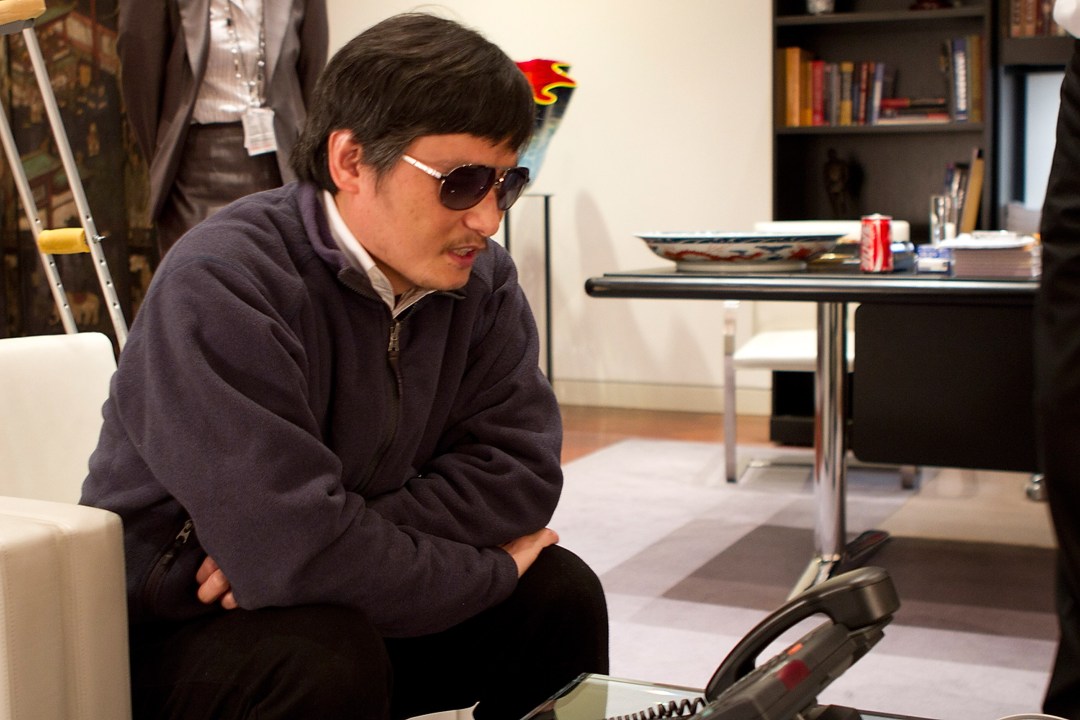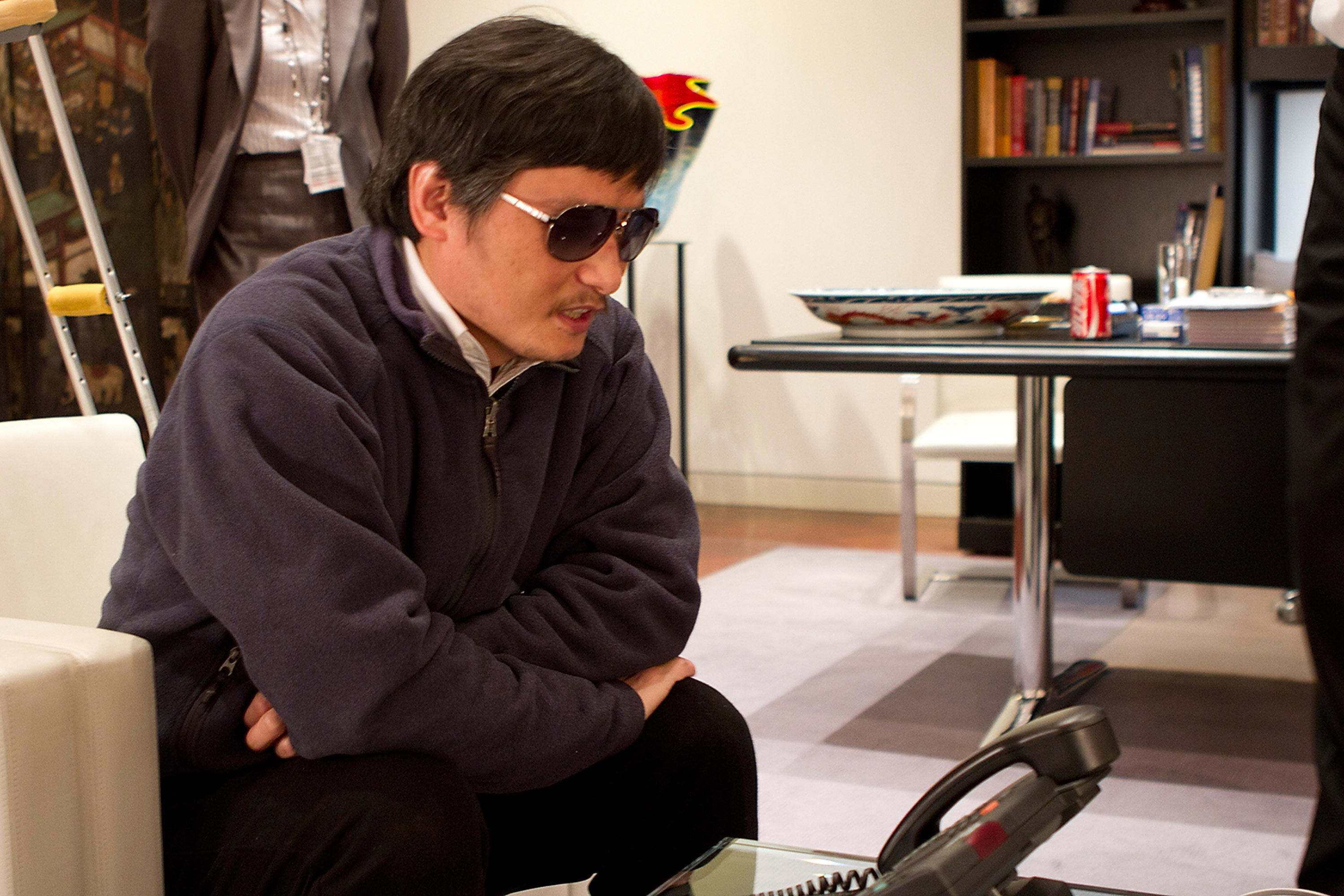Even in a Beijing Spring of ceaseless surprises, the escape of the blind dissident lawyer Chen Guangcheng from rural house arrest into American protection was a sensation. The sensation soon turned into a catastrophe for him and humiliation for the United States.
After his astounding escape 2 weeks ago from 18 months of house arrest and arrival at the US embassy in Beijing, Chen stated he had no intention of leaving China. Six days later he was assured by his American hosts, who now say he had cancer, that he must go to a Chinese hospital for treatment and be reunited with his and then would be free, perhaps to enter a Chinese university.
There were touching scenes of Chen holding hands with Ambassador Gary Locke on his way to the hospital. According to Chen’s lawyer, Li Jinsong, Chen told him that he now had ‘true
freedom’, national laws protected his rights, and he was ‘a free citizen’. Secretary of State Clinton, in Beijing for high-level negotiations, said,
But from his hospital room, Chen said,‘I am pleased that we were able to facilitate Chen Guangcheng’s stay and departure from the U.S. Embassy in a way that reflected his choices and our values.’
As the embassy’s assurances — which included its promise to keep an eye on Chen — unravelled, the BBC reported that Chen told its reporters that the Chinese authorities threatened to kill him if he stayed in the embassy and he wanted to leave China. Channel 4 reported that a weeping Mr. Chen said ‘…he wasn’t protected by the Americans as they had promised, and he needed to leave China for a while to rest’.‘I would like to say to President Obama — please do everything you can to get our family out… The embassy kept lobbying me to leave and promised to have people stay with me in the hospital. But this afternoon as soon as I checked into the hospital room, I noticed they were all gone.’
It is astonishing that Washington imagined that Beijing would permit Chen, the only significant Chinese dissident not behind bars or in exile, to remain at large and disseminate his well-known views on human rights.
Chen has now been offered a place at New York University and Beijing says he can leave China. Almost all Chinese dissidents are permitted to leave the country after their detentions expire.
Chen’s escape two weeks ago was worthy of Houdini. But Houdini wasn’t blind from infancy, imprisoned for four years, kept under house arrest watched by policemen and local thugs, and never — this is the mysterious part — travelled across country for several hours on his own before meeting an accomplice who drive him several hundred miles to some sort of American protection.
For days neither China nor the US publicly acknowledged Chen’s flight to safety. But Beijing instantly stipulated new taboo words including ‘Shawshank Redemption’ — a reference to the 1994 film in which a long-term innocent prisoner ingeniously escapes from a high-security prison.
Secret negotiations about what to do with Chen before Hillary Clinton’s arrival in Beijing were designed to save face in both countries. But China’s Foreign Ministry declared,
For some Chinese, Chen became a hero. Ai Xiaoming, a documentary film maker in south China, said of the daring escape, ‘If a blind person can break out of the darkness to freedom, then everyone can.’‘The U.S. method was interference in Chinese domestic affairs, and this is totally unacceptable to China.’
Born on November 12 1971, married and with two small children, Chen’s escape was the latest episode in a life of blindness, years of illiteracy and meager education in schools for the blind. In 2005, after teaching himself law, he took up as a class action the thousands of cases of enforced abortion and sterilization in his home province of Shandong. By 2006 he had been tried for obstructing traffic and criminal damage and imprisoned for four years. In late 2010 he was released into confinement in a village farmhouse in Shandong. Police and strong-arm roughed up anyone attempting to visit him.
How Chen escaped remains shadowy, largely to protect the network of conspiracy that made it possible. Somehow eluding his guards, he climbed a wall and made his way through a dark countryside. Using his surprisingly untapped cellphone he had alerted activists, one of whom met him and drove him for several hours to Beijing, first to safe houses and then to the US Embassy.
Once under US protection, Chen issued a video appeal to Premier Wen Jiabao, urging him to direct an investigation into ‘who ordered 70 to 80 county public security and party and administrative officials to my home to loot and beat and harm us without any legal procedure’.
During his six days under US protection, Chen insisted he had no desire to leave China. ‘He believes no power can stop China from moving in the direction of rule of law,’ said Hu Jia, a fellow dissident. ‘He’s optimistic and he wants to be involved in that process.”’
The last significant dissident protected in the American embassy in Beijing was the astrophysicist Fang Lizhi. On June 5 1989, just after the Tiananmen killings, Fang and his scientist wife, Li Shuxian, were officially named as the two most wanted ‘criminals’ in China and entered the American embassy. Fang, who has recently died and his wife spent thirteen months in the embassy, leaving China for Cambridge University and six months later move to the University of Arizona.
Those were different times. With Clinton on her way to Beijing for the periodic ‘Strategic and Economic Dialogue’ between China and the US, how to handle Chen Guangcheng became bi-lateral headache — especially because Chen declared he wished to stay in China. It would be impossible, however, to keep him under the American umbrella if the Dialogue was to proceed smoothly. President Obama is facing an election in which his opponent, Mitt Romney, may accuse the president of placating China.
Many Chinese human rights champions and advocates are either in prison or in some other form of detention. The only one internationally known is Nobel Peace Prize winner Liu Xiaobo. According to International PEN, 35 writers are in prison. Dozens of others, now living in exile, were barred from attending the recent London Book Fair, where Beijing’s censors, with the support of the British Council, invited only those in official favor. Tibetan lamas and ordinary people, devoted to the Dalai Lama and regional independence, are burning themselves to death. During the genuine Chinese Spring of 1989, millions of people in hundreds of cities called for basic changes in central politics including the removal of Deng Xiaoping and Premier Li Peng.
The Communist Party knows that Mr Chen is dangerous inside the country. When I suggested to a resident of China that sending Chen to the US would be a quick fix for both Beijing and Washington, if not for Chinese human rights, she replied, ‘Of course. Everyone who leaves becomes largely irrelevant.’







Comments